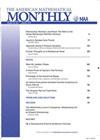离散定理
IF 0.4
4区 数学
Q4 MATHEMATICS
引用次数: 0
摘要
1827年,高斯证明了高斯曲率实际上是一个本征量,这意味着它可以通过表面内部的测量来计算。在此之前,曲面的曲率只能从外部计算,这意味着需要一个环境空间。高斯将这一非凡的发现命名为“惊人定理”。本文讨论了该定理在多面体曲面上的离散化形式。给出了离散高斯曲率的一般外在定义和内在定义是等价的一个初等证明。作者感谢两位匿名审稿人和编委会的宝贵意见。这项研究是在第二作者在波恩的马克斯普朗克数学研究所逗留期间开始的。该项目由德国研究基金会(Deutsche Forschungsgemeinschaft DFG)通过“几何和动力学离散化”合作研究中心TRR 109和德国卓越战略-柏林数学研究中心MATH+ (ec -2046/1,项目ID: 390685689)资助。作者简介:thomas F. BANCHOFF,布朗大学数学名誉教授,1967年至2015年任教于布朗大学。他于1964年在加州大学伯克利分校获得博士学位,并于1999年至2000年担任MAA主席。布朗大学数学系,邮编:151 Thayer Street, Providence RI 02912Thomas_Banchoff@brown.eduFelix g本文章由计算机程序翻译,如有差异,请以英文原文为准。
The Discrete Theorema Egregium
AbstractIn 1827, Gauss proved that Gaussian curvature is actually an intrinsic quantity, meaning that it can be calculated just from measurements within the surface. Before, curvature of surfaces could only be computed extrinsically, meaning that an ambient space is needed. Gauss named this remarkable finding Theorema Egregium. In this paper, we discuss a discrete version of this theorem for polyhedral surfaces. We give an elementary proof that the common extrinsic and intrinsic definitions of discrete Gaussian curvature are equivalent. AcknowledgmentThe authors thank the two anonymous reviewers and the editorial board for their valuable remarks. The research was initiated during the second author’s stay at the Max Planck Institute for Mathematics in Bonn. It was funded by the Deutsche Forschungsgemeinschaft DFG through the Collaborative Research Center TRR 109 “Discretization in Geometry and Dynamics” and under Germany’s Excellence Strategy – The Berlin Mathematics Research Center MATH+ (EXC-2046/1, project ID: 390685689).Additional informationNotes on contributorsThomas F. BanchoffTHOMAS BANCHOFF is professor emeritus of mathematics at Brown University, where he taught from 1967 to 2015. He received his Ph.D. from the University of California, Berkeley, in 1964 and served as president of the MAA from 1999 to 2000.Department of Mathematics, Brown University, Box 1917, 151 Thayer Street, Providence RI 02912Thomas_Banchoff@brown.eduFelix GüntherFELIX GÜNTHER received his Ph.D. in mathematics from Technische Universität Berlin in 2014. After holding postdoctoral positions at the Institut des Hautes Etudes Scientifiques in Bures-sur-Yvette, the Isaac Newton Institute for Mathematical Sciences in Cambridge, the Erwin Schrödinger International Institute for Mathematics and Physics in Vienna, the Max Planck Institute for Mathematics in Bonn, and the University of Geneva, he came back to Technische Universität Berlin in 2018. His research interests include discrete differential geometry and discrete complex analysis. He also has a passion for science communication.Technische Universität Berlin, Institut für Mathematik MA 8-3, Straße des 17. Juni 136, 10623 Berlin, Germanyfguenth@math.tu-berlin.de
求助全文
通过发布文献求助,成功后即可免费获取论文全文。
去求助
来源期刊

American Mathematical Monthly
Mathematics-General Mathematics
CiteScore
0.80
自引率
20.00%
发文量
127
审稿时长
6-12 weeks
期刊介绍:
The Monthly''s readers expect a high standard of exposition; they look for articles that inform, stimulate, challenge, enlighten, and even entertain. Monthly articles are meant to be read, enjoyed, and discussed, rather than just archived. Articles may be expositions of old or new results, historical or biographical essays, speculations or definitive treatments, broad developments, or explorations of a single application. Novelty and generality are far less important than clarity of exposition and broad appeal. Appropriate figures, diagrams, and photographs are encouraged.
Notes are short, sharply focused, and possibly informal. They are often gems that provide a new proof of an old theorem, a novel presentation of a familiar theme, or a lively discussion of a single issue.
Abstracts for articles or notes should entice the prospective reader into exploring the subject of the paper and should make it clear to the reader why this paper is interesting and important. The abstract should highlight the concepts of the paper rather than summarize the mechanics. The abstract is the first impression of the paper, not a technical summary of the paper. Excessive use of notation is discouraged as it can limit the interest of the broad readership of the MAA, and can limit search-ability of the article.
 求助内容:
求助内容: 应助结果提醒方式:
应助结果提醒方式:


